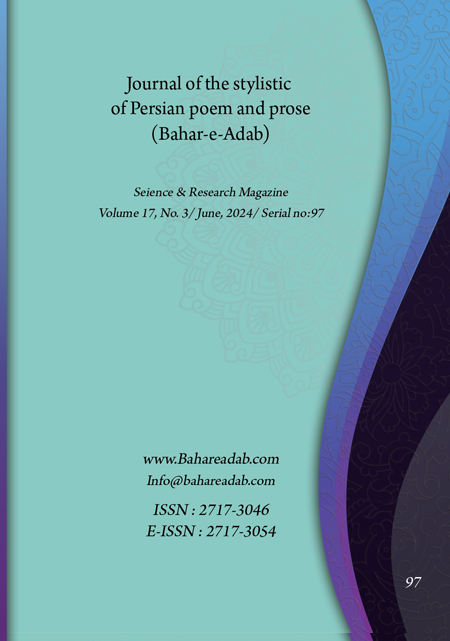- Count View : 404
- آدرس کوتاه شده مقاله: https://bahareadab.com/article_id/1637
- کد DOI مقاله: DOI:10.22034/bahareadab.2024 .17 .7357
Journal of the stylistic of Persian poem and prose
volume Number 17،
number In Volume 3،
،
issue Number 97
Examining the sharia laws of stealing and drinking alcohol in Sanaei and Sa’di poems and their differences and similarities
AkhtarEsmailzadeh undefined , Mohammad Hojjat (Author in Charge), Jalal Iranmanesh
Abstract
BACKGROUND AND OBJECTIVES: In their poems, Sanaei and Saadi have repeatedly talked about Shariah and jurisprudential issues and have explained part of their approaches in various fields by relying on these issues and their broad semantic dimensions. Based on this, in the forward research, the aim is to deal with the two sharia categories of theft and drinking alcohol and related rulings in the poetry of these poets, and finally, examine Islamic jurisprudence from a new perspective and with a poetic attitude. put The main question of the research is, what concepts have Sanai and Saadi explained and made available to the audience by using the mentioned jurisprudential terms?
METHODOLOGY: This research was done based on library sources and descriptive-analytical method.
FINDINGS: The words of Sana"i and Saadi are full of direct and indirect references to Shari"a boundaries, and they have used every expression, including Shari"a terms, to express their opinions. As a result, all the examples used in their poems, which contain concepts related to theft and drinking alcohol, do not have a jurisprudential function and have a multifaceted aspect.
CONCLUSION: Conclusion: The mentioned poets have tried to provide their mystical and moral messages to their audience by using the capacities of the concepts and terms related to the Shariah limits, and therefore, their poems in most cases are not through the gate of jurisprudence. It can be analyzed and analyzed from a literary and mystical perspective.
Keyword
Sana'i
, Saadi
, poetry
, Sharia rulings
, jurisprudence
- Holy Quran.
- Porjavadi, Nasrallah. (1991). The wind of love (1): the historical course of the mystical meaning of wind or May in Persian poetry, Nash Danesh magazine, year 11, number 6, pp. 4-13
- 3. Pourhasan Sangri, Ali. (2012). Examining the stories of Kalileh and Demeneh from the perspective of criminology and criminal policy, Ta'al Law Magazine, No. 5, pp. 161-185.
- Al-Jazeiri, Abd al-Rahman (2004). Fiqh Ali al-Mahabh al-Araba, 5 volumes, bi ja: Maktab al-Thaqaf al-Diniyeh.
- Jafari Langroudi, Mohammad Jaafar (1995). Legal Terminology, 7th edition, Tehran: Ganj Danesh.
- Jalili, Reza. (2018). A comparative comparison of Ibn Faraz and Hakim Nizari Qahestani's mystical Khumriat, Journal of Comparative Language and Literature of Nations, Year 5, Number 15, pp.127-148.
- Haramali, Muhammad bin Hassan (2008). The means of the Shia to study the issues of the Sharia, the effort and research of Abdul Rahim Rabbani Shirazi, 9th edition, Tehran: Islamia.
- Rostami, Hadi and Molabighi, Ali. (2015). Criminological reading of Saadi's works with emphasis on Golestan and Bostan, Legal Research Magazine, No. 77, pp.263-299..
- Zakavati Karagzlou, Alireza. (1988). Hafez and Ibn Faraz, Nashr Danesh, No. 47, pp. 3-9.
- Saadi, Moslehuddin (2004). Kaliat Saadi, edited by Mohammad Ali Foroughi, Tehran: Shaghaig.
- Sanai, Majdod bin Adam (2009). Hadiqah al-Haqiqah, edited by Azizullah Alizadeh, Tehran: Ferdous.
- Senai, Majdod bin Adam (2008). Divan of Poems, corrected by Mohammad Beqaei, Tehran: Taati.
- Shah Mohammadi, Maryam. (2010). Legal rules in contemporary texts of Persian literature, under the guidance of Dr. Nariman Fakheri, thesis of Payam Noor University.
- Sharif-Nasab, Maryam. (2004). An examination of Badeh in Rumi's Masnavi with a view to Ibn Faraz's Khamriya, Allameh Tabatabai University Literary Text Research Magazine, No. 19, pp. 190-204.
- Shafii-Kadkani, Mohammad Reza (1997). conduct whips; Criticism and analysis of some odes by Hakim Sanai, Tehran: Age.
- Sahib bin Emad (1993). Kafi al-Kifah, Ismail bin Hamad, Beirut: Al-Muhait fi al-Lagheh.
- Tabatabai, Seyyed Ali (2001). Riaz al-Masal fi bayan al-ahkam with reasons, Qom: Islamic publication.
- Fadel Handi, Muhammad bin Hassan (1904). Kashf-ul-Latham, Qom: Marashi Najafi Library.
- Faiz Kashani, Muhammad bin Morteza (1998). Al-Safi fi Tafsir al-Qur'an, Tehran: Dar al-Kutb-al-Islamiyeh.
- Kashif al-Ghata, Mohammad Hossein (2009). Asl al-Shia, translated by Nasser Makarem Shirazi, Qom: Imam Ali Bin Abi Talib School.
- Najafi, Muhammad Hassan bin Baqir (1983). Jawaharlal Kalam in the interpretation of Sharia al-Islam, Beirut: Dar Ihya al-Trath al-Arabi.
- Nouri, Mohammad Ismail (2005). A brief introduction to jurisprudence, Qom: Islamic Publications Office.

